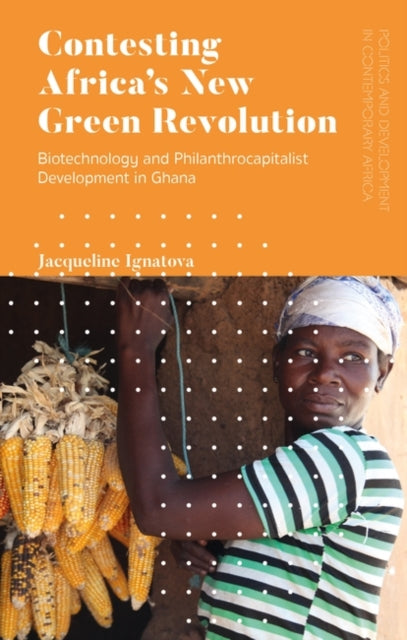Jacqueline A.Ignatova
Contesting Africa's New Green Revolution: Biotechnology and Philanthrocapitalist Development in Ghana
Contesting Africa's New Green Revolution: Biotechnology and Philanthrocapitalist Development in Ghana
- Condition: Brand new
- UK Delivery times: Usually arrives within 2 - 3 working days
- UK Shipping: Fee starts at £2.39. Subject to product weight & dimension
Bulk ordering. Want 15 or more copies? Get a personalised quote and bigger discounts. Learn more about bulk orders.
Couldn't load pickup availability
- More about Contesting Africa's New Green Revolution: Biotechnology and Philanthrocapitalist Development in Ghana
Genetically modified crops are a controversial topic in the Global South, with proponents seeing them as pro-poor innovation and critics seeing them as a threat to food sovereignty and the environment. Jacqueline Ignatova's research shows how efforts to transform the seed sector in northern Ghana may exacerbate inequality, but local farmers are adept at blending traditional and modern agricultural methods that subvert the interests of global agribusiness.
Format: Hardback
Length: 216 pages
Publication date: 17 June 2021
Publisher: Bloomsbury Publishing PLC
Genetically modified crops (GMCs) have emerged as a significant component of development strategies across the Global South, despite generating intense controversy. Supporters view them as a manifestation of "pro-poor innovation," while critics perceive them as a threat to food sovereignty and the environment. The promotion of biotechnology is a vital aspect of "new Green Revolution for Africa interventions," and it is intricately linked to the emergence of "philanthrocapitalism," which advocates for business-driven solutions to combat poverty.
In her book, Jacqueline Ignatova delves into the complexities of efforts to transform the seed sector in northern Ghana, which is considered a crucial laboratory for this "new Green Revolution." Through in-depth interviews with farmers, policymakers, and agricultural scientists, she explores how these initiatives may exacerbate the inequality they were initially intended to address. However, she also argues that the effects of GMCs in Ghana have been far more intricate and multifaceted than either side of the debate has acknowledged.
Local farmers in Ghana have demonstrated remarkable adaptability by skillfully blending traditional and modern agricultural methods, effectively subverting the interests of global agribusiness. They have developed innovative practices such as intercropping, crop rotation, and the use of organic fertilizers, which not only enhance soil fertility but also mitigate the risks associated with GMOs. These strategies have helped to improve crop yields, reduce poverty, and promote sustainable agriculture in the region.
While GMCs have undoubtedly brought about some benefits, they have also raised concerns about potential environmental impacts and the loss of biodiversity. Critics argue that the widespread adoption of GMOs could lead to the dominance of a few large corporations, undermine local agriculture, and exacerbate food insecurity. They also point out the potential risks associated with GMOs, such as the potential for gene transfer to non-GMO crops and the potential for unintended consequences on human health and the environment.
To address these concerns, it is essential to implement robust regulatory frameworks and promote transparent and accountable governance in the GMO industry. This includes ensuring that GMOs are tested for their safety and environmental impact before they are introduced into the market, as well as providing farmers with access to information and training on the safe and sustainable use of GMOs. Additionally, efforts should be made to promote sustainable agriculture practices that prioritize the preservation of biodiversity and the protection of the environment.
In conclusion, the debate over genetically modified crops in the Global South is complex and multifaceted. While GMCs have the potential to bring about significant benefits, they also raise concerns about food sovereignty, environmental impact, and the potential for unintended consequences. It is essential to approach this issue with a balanced and informed perspective, considering the potential benefits and risks associated with GMOs and promoting sustainable agriculture practices that prioritize the well-being of both farmers and the environment.
Weight: 490g
Dimension: 164 x 241 x 20 (mm)
ISBN-13: 9781786996558
This item can be found in:
UK and International shipping information
UK and International shipping information
UK Delivery and returns information:
- Delivery within 2 - 3 days when ordering in the UK.
- Shipping fee for UK customers from £2.39. Fully tracked shipping service available.
- Returns policy: Return within 30 days of receipt for full refund.
International deliveries:
Shulph Ink now ships to Australia, Belgium, Canada, France, Germany, Ireland, Italy, India, Luxembourg Saudi Arabia, Singapore, Spain, Netherlands, New Zealand, United Arab Emirates, United States of America.
- Delivery times: within 5 - 10 days for international orders.
- Shipping fee: charges vary for overseas orders. Only tracked services are available for most international orders. Some countries have untracked shipping options.
- Customs charges: If ordering to addresses outside the United Kingdom, you may or may not incur additional customs and duties fees during local delivery.


